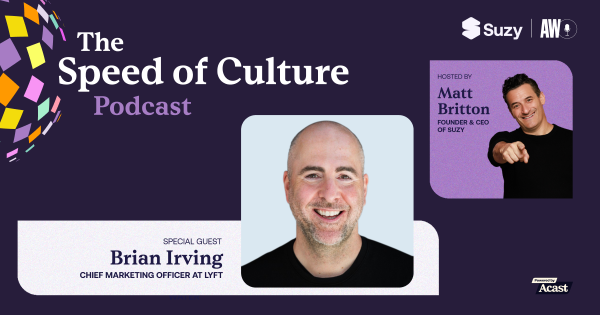Copyright Adweek

As technology reshapes mobility and consumer habits shift, Lyft is staying grounded in its original purpose: serving and connecting people. From rideshare to bikes and an emerging role in autonomous vehicles, the company continues to expand while keeping the human experience at its core. In this conversation with Matt Britton, Brian Irving, CMO at Lyft, explains why Lyft sees itself as a purposeful rebel, how AI is becoming a force multiplier for marketing teams, and why psychological safety is essential for helping employees embrace change at the pace of innovation. From Lyft Silver and bike share to AV partnerships and creator strategy, Brian shares a pragmatic playbook for serving people better as riders, drivers, and employees, while building an AI-native organization rooted in psychological safety, critical thinking, and purposeful execution. Brian Irving is the CMO at Lyft, where he is leading the company’s evolution into a human-first mobility platform. At Lyft, he is responsible for shaping a brand defined by its purpose to serve and connect—supporting drivers, empowering riders, and building products like Lyft Silver that meet real human needs while preparing for an autonomous future. Before joining Lyft, Brian held senior leadership roles at some of the world’s most influential companies, including Apple, Google, Airbnb, Eventbrite, Meta Reality Labs, and Hampton Creek. Across these chapters, he has blended deep expertise in data, performance marketing, and brand craft to deliver outcomes at scale. Known for his belief that marketing should be both brand-driven and outcome-obsessed, Brian has built a reputation as a modern CMO who embraces change, develops AI-native teams, and creates cultures of psychological safety where curiosity and creativity thrive. His guiding principle: say yes to opportunities that open new doors. Listen to Brian Irving on The Speed of Culture to learn how Lyft scales a human-first brand, prepares for an AV future, and builds an AI-native marketing culture where curiosity, safety, and execution power real-world growth. Key Takeaways: [00:42] Human Connection Is Lyft’s Core — Brian explains that Lyft was never just about getting from point A to point B. The company’s early culture of pink mustaches and front-seat fist bumps symbolized a belief that the journey itself matters. Even as the brand matured beyond those symbols, Lyft has stayed rooted in its purpose: to serve and connect. For Brian, this means keeping real drivers at the center of the platform, ensuring passengers feel cared for, and proving that mobility is not just functional but deeply human. [02:42] Serving Drivers Unlocks Market Advantage — While rideshare is often framed as a race to onboard drivers, Brian stresses that Lyft’s differentiation lies in how it serves them once they join. Whether someone drives full-time or only for a few hours a week, Lyft focuses on helping maximize their time and earnings. This service-first approach has led to driver preference scores significantly higher than competitors. By supporting drivers as people, not just a supply, Lyft strengthens loyalty and ensures riders receive better service. [06:06] Autonomous Vehicles Are Still Early — Asked where we are in the AV journey, Brian says we’re only “buying tickets to the stadium.” The technology is exciting but still in its earliest innings. Lyft’s strategy is to enable AV partners by offering fleet management and onboarding support while maintaining its human-first philosophy. Crucially, Brian emphasizes bringing drivers along on this journey rather than sidelining them, ensuring that the future of AV remains connected to human needs and doesn’t erase the driver community. [08:30] AI as a Force Multiplier, Not a Threat — Brian frames AI not as a replacement for marketers but as a multiplier of human capacity. He tells his team to imagine AI as hundreds of new employees who need training and conditioning. Used properly, AI shifts work away from aggregation and organization toward critical thinking. He notes the pace of change is so fast that five-year roadmaps are impractical; leaders should think in six- to twelve-month horizons where AI’s limitations will quickly become capabilities. [10:48] Creating Psychological Safety for AI Adoption — For AI to take root, Brian says leaders must build a culture of safety and experimentation. At Lyft, his team runs AI challenges, pilots new tools, and rethinks job descriptions and processes. Early on, many felt like using AI was “cheating,” but Brian reframed it as enablement. By encouraging people to share learnings openly, he ensures AI isn’t hidden or feared but embraced as part of daily work. For him, adoption is less about technology and more about culture and trust. [15:32] Purposeful Rebellion Drives Product Innovation — Brian describes Lyft as a “purposeful rebel,” a challenger brand that pushes against the status quo while staying grounded in service. This mindset shows up in products like Lyft Silver, designed for older or less tech-confident riders who still need safe mobility. It also shapes cultural partnerships, like working with Billie Jean King during the US Open, which aligns brand purpose with timely cultural moments. For Brian, the real marketing unlock comes when consumer insight is baked into the product itself.



